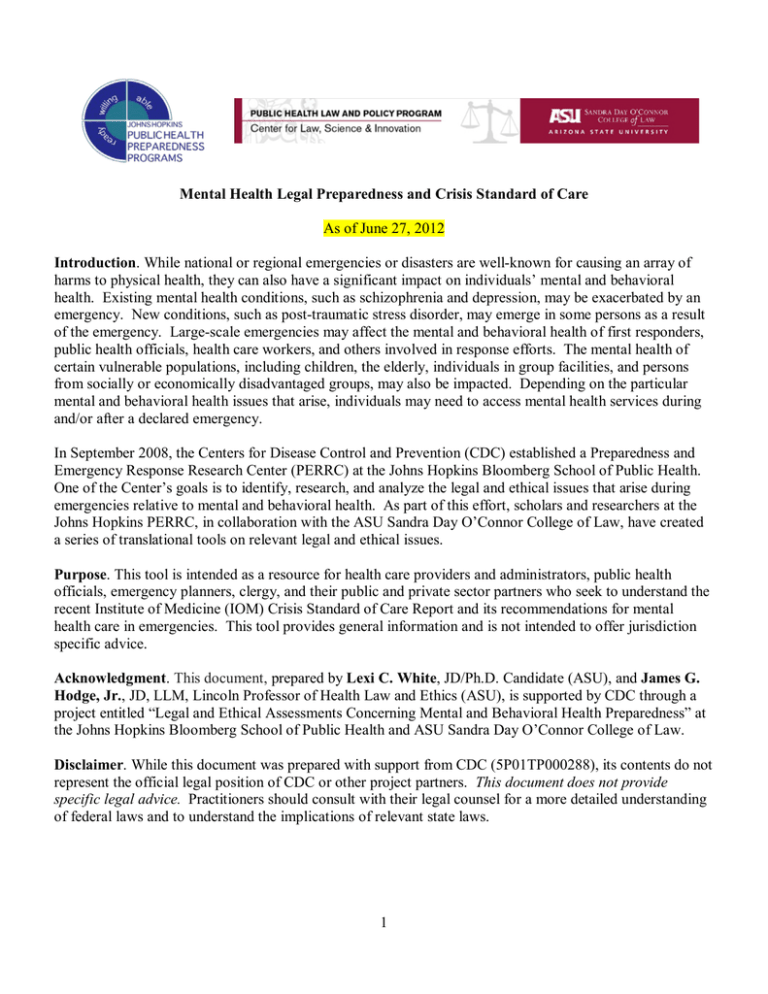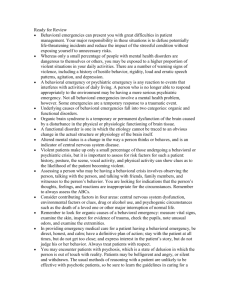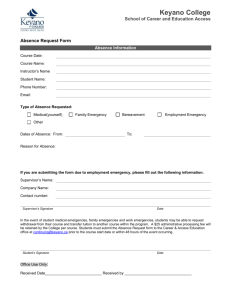As of June 27, 2012
advertisement

Mental Health Legal Preparedness and Crisis Standard of Care As of June 27, 2012 Introduction. While national or regional emergencies or disasters are well-known for causing an array of harms to physical health, they can also have a significant impact on individuals’ mental and behavioral health. Existing mental health conditions, such as schizophrenia and depression, may be exacerbated by an emergency. New conditions, such as post-traumatic stress disorder, may emerge in some persons as a result of the emergency. Large-scale emergencies may affect the mental and behavioral health of first responders, public health officials, health care workers, and others involved in response efforts. The mental health of certain vulnerable populations, including children, the elderly, individuals in group facilities, and persons from socially or economically disadvantaged groups, may also be impacted. Depending on the particular mental and behavioral health issues that arise, individuals may need to access mental health services during and/or after a declared emergency. In September 2008, the Centers for Disease Control and Prevention (CDC) established a Preparedness and Emergency Response Research Center (PERRC) at the Johns Hopkins Bloomberg School of Public Health. One of the Center’s goals is to identify, research, and analyze the legal and ethical issues that arise during emergencies relative to mental and behavioral health. As part of this effort, scholars and researchers at the Johns Hopkins PERRC, in collaboration with the ASU Sandra Day O’Connor College of Law, have created a series of translational tools on relevant legal and ethical issues. Purpose. This tool is intended as a resource for health care providers and administrators, public health officials, emergency planners, clergy, and their public and private sector partners who seek to understand the recent Institute of Medicine (IOM) Crisis Standard of Care Report and its recommendations for mental health care in emergencies. This tool provides general information and is not intended to offer jurisdiction specific advice. Acknowledgment. This document, prepared by Lexi C. White, JD/Ph.D. Candidate (ASU), and James G. Hodge, Jr., JD, LLM, Lincoln Professor of Health Law and Ethics (ASU), is supported by CDC through a project entitled “Legal and Ethical Assessments Concerning Mental and Behavioral Health Preparedness” at the Johns Hopkins Bloomberg School of Public Health and ASU Sandra Day O’Connor College of Law. Disclaimer. While this document was prepared with support from CDC (5P01TP000288), its contents do not represent the official legal position of CDC or other project partners. This document does not provide specific legal advice. Practitioners should consult with their legal counsel for a more detailed understanding of federal laws and to understand the implications of relevant state laws. 1 Mental Health Legal Preparedness and Crisis Standard of Care Background: Emergencies and disasters can exacerbate existing mental health conditions as well as lead to new conditions, such as post-traumatic stress disorder. During declared emergencies when essential resources are limited, a shift to a crisis standard of care (CSC) may be necessary, resulting in potential deviations from traditional medical or public health practices. Persons may not receive the same public health or medical services they would in non-emergency situations due to limited resources and personnel. 1 Treatment of existing or prospective mental and behavioral health conditions may be directly compromised. Implementation of a CSC may also have mental and behavioral health consequences for patients, relatives, and providers. Legal issues inherent in the implementation of a CSC can help mitigate negative repercussions on mental and behavioral health status across populations as follows: • Screening: Health care providers may be at particular risk of mental health impacts, especially when a CSC is implemented. Provisions of the Model State Emergency Health Powers Act (MSEHPA), incorporated into the laws of several states, allow qualified public health agents to offer screening to health care providers for mental health conditions during emergencies. 2 While such screening and corresponding reporting practices are not compulsory, some jurisdictions’ emergency plans include efforts to identify and treat mental health conditions among health care providers during emergencies, such as stress inoculation and psychological first aid. 3 • Licensing: Licensure reciprocity provisions set forth in MSEHPA, 4 the Uniform Emergency Volunteer Health Practitioners Act (UEVHPA), and multiple other state laws allow licensure portability for health care providers and registered volunteer health practitioners, including mental and behavioral health professionals. 5 Licensure portability facilitates aid from mental and behavioral health care providers to help meet patient surge capacity during declared emergencies. Practitioners working in states other than those in which they are primarily licensed should be aware of the possible implementation of a CSC during the course of providing emergency health services. • Liability: Practitioners may have heightened liability concerns during emergencies, especially when decisions concerning patient care pursuant to implementation of a CSC may contravene standard medical or public health practices. Personal liability concerns may also arise for practitioners who may experience severe mental health conditions during crises. Multiple laws, including MSEHPA, UVEHPA, the federal PREP Act, federal and state Volunteer Protection Acts, and individual state provisions, may limit liability for mental health care providers, especially volunteers, during declared emergencies. • Resource Allocation: Emergency declarations can instantly change how and where resources and care are allocated via the public and private sectors. Federal and state emergency laws authorize direct allocation of powers to gather and distribute limited resources. Memoranda of understanding, mutual-aid agreements, compacts, and other agreements can facilitate resource sharing between jurisdictions during emergencies. In particular, these agreements can help provide mental health medications and other resources, such as informational materials, to patients, families, and responders rapidly. • Balance of Individual Rights and Communal Objectives: Implementation of a CSC requires constant balancing of individual and communal interests in the allocation and distribution of resources. Those with mental or behavioral health conditions are entitled to similar treatment as other patients. Use of emergency public health powers (e.g., social distancing, quarantine, and isolation) that may contribute to mental and behavioral health conditions within populations should be considered carefully and used only as needed to obviate potential negative mental health effects on individuals. 2 References 1 Comm. on Guidance for Establishing Crisis Standards of Care for Use in Disaster Situations, Inst. of Med. of the Nat’l Acads., Crisis Standards of Care: A Systems Framework for Catastrophic Disaster Response 1-91 (Dan Hanfling et al., eds. 2012). 2 Ctr. for Law & Public’s Health at Georgetown & Johns Hopkins U., Model State Emergency Health Powers Act (MSEHPA) 1 (2001), available at http://www.publichealthlaw.net/MSEHPA/MSEHPA2.pdf. 3 Comm. on Guidance for Establishing Crisis Standards of Care for Use in Disaster Situations, Inst. of Med. of the Nat’l Acads., Crisis Standards of Care: A Systems Framework for Catastrophic Disaster Response (Dan Hanfling et al., eds. 2012). 4 MSEHPA § 608(b)(2). 5 NAT’L CONFERENCE OF COMM’RS ON UNIF. STATE LAWS, UNIFORM EMERGENCY VOLUNTEER HEALTH PRACTITIONERS ACT (UEVHPA) § 2(15) (2006), available at http://www.uevhpa.org/Uploads/uevhpafinal.pdf. 3



